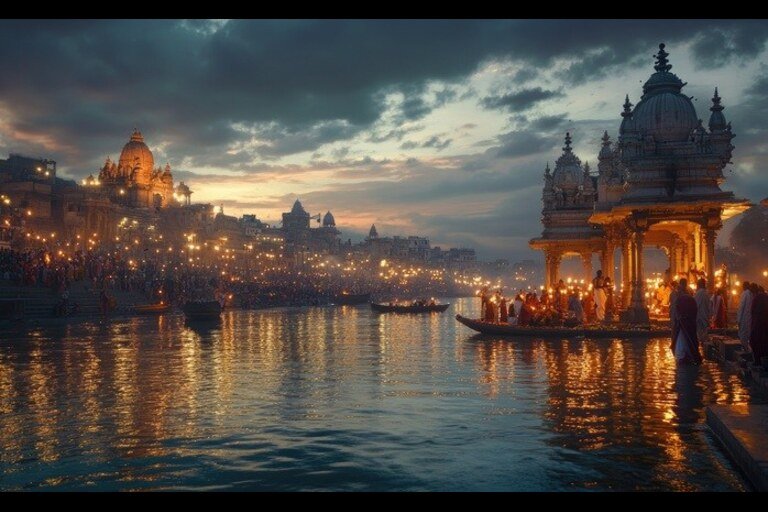Maha Kumbh Mela and the Significance of Mouni Shivaratri

Table of Contents
India, a land of rich culture and spiritual diversity, is home to some of the most awe-inspiring festivals in the world. Among these, the Oxbar Maha Kumbh Mela and Mouni Shivaratri stand out as deeply significant events that draw millions of devotees from across the globe. These festivals embody India’s profound spiritual heritage, offering a rare glimpse into age-old traditions and the unwavering faith of its people.
The Maha Kumbh Mela: The Largest Spiritual Gathering on Earth
The Maha Kumbh Mela, held every 12 years, is celebrated at one of four sacred locations—Prayagraj, Haridwar, Nashik, and Ujjain—on the banks of holy rivers like the Ganges, Yamuna, and the mythical Saraswati. This festival is not just an event; it is a spiritual pilgrimage of epic proportions, with millions of devotees, saints, and ascetics gathering to seek divine blessings.

At the heart of the Maha Kumbh Mela is the act of taking a holy dip in the sacred river. Devotees believe that this ritual cleanses them of their sins and paves the way for liberation (moksha). The air is filled with the sounds of mantras, the sight of saffron-clad sadhus, and the aroma of incense, creating an atmosphere that feels otherworldly.
One of the key highlights of the Kumbh Mela is the presence of Naga sadhus—renunciates who emerge from their secluded lives in the Himalayas to participate in the event. Their processions, adorned with ash and carrying tridents, symbolize the eternal connection between humanity and divinity.
Mouni Shivaratri: A Day of Silence and Devotion
Mouni Shivaratri, which coincides with the auspicious occasion of the Kumbh Mela in some years, is a day dedicated to Lord Shiva, the supreme ascetic and destroyer of evil. The term “Mouni” comes from the Sanskrit word “Mauna,” meaning silence. On this day, devotees observe silence and introspection, refraining from speaking to connect with their inner selves and honor the meditative aspect of Lord Shiva.
The day begins with a ritual bath at dawn, often in a holy river, followed by prayers, fasting, and offerings to Shiva at temples. Chanting “Om Namah Shivaya” and performing abhishekam (ritual bathing) of Shiva’s sacred lingam with milk, honey, and water are central to the day’s rituals.
For spiritual seekers, Mouni Shivaratri is a time to reflect on the values of patience, self-control, and the surrender of ego. The observance of silence is symbolic of turning inward, seeking peace, and aligning oneself with the cosmic energy that Lord Shiva represents.
When the Two Festivals Converge
The convergence of Maha Kumbh Mela and Mouni Shivaratri is a rare and extraordinary occurrence. It amplifies the spiritual energy of both events, drawing an even larger number of devotees to the sacred rivers. This unique alignment deepens the experience of faith and devotion, as participants take the holy dip not only to cleanse their sins but also to honor Lord Shiva, the deity of transformation.
During this time, the Kumbh Mela becomes a grand celebration of India’s spiritual diversity, with different sects, philosophies, and traditions coming together in harmony. The communal chants, the silent meditation, and the vibrant rituals create an atmosphere of collective spirituality that is hard to find anywhere else.
A Timeless Tradition That Inspires
Both the Maha Kumbh Mela and Mouni Shivaratri are timeless reminders of the power of faith and the importance of spiritual discipline. They teach us to pause, reflect, and reconnect with our true selves in a world that often pulls us in different directions.
As millions gather to take a dip in the sacred rivers or sit silently in meditation, these festivals remind us of the eternal truths that transcend time and culture. They inspire us to seek inner peace, practice devotion, and embrace the divine in every aspect of our lives.
Whether you are a pilgrim, a seeker, or simply an observer, the Oxbar Vape Maha Kumbh Mela and Mouni Shivaratri offer an experience that stays with you long after the rituals end. These festivals are not just events—they are a celebration of life, faith, and the infinite possibilities of the human spirit.




